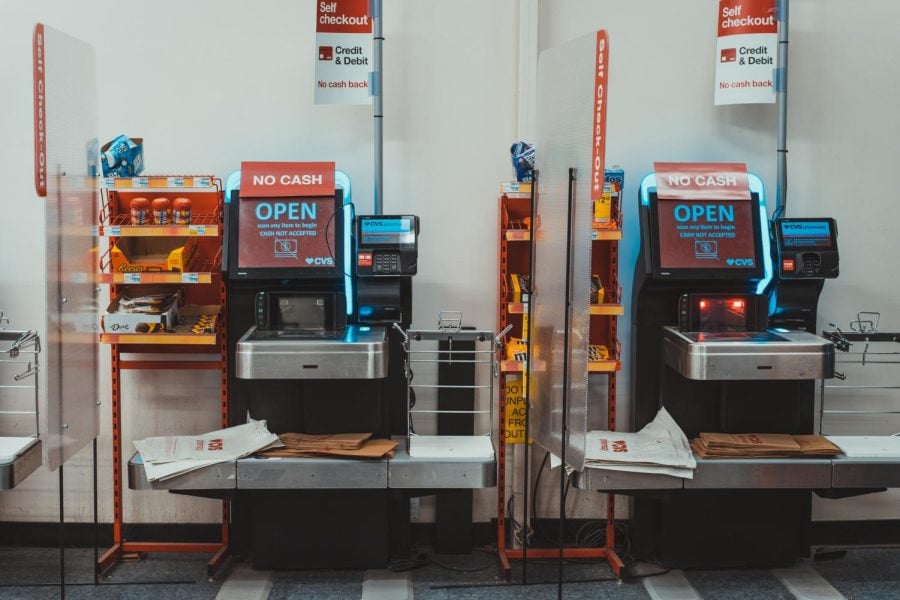As city considers banning cashless businesses, business owners and advocates express mixed reactions
Jonah Elkowitz/Daily Senior Staffer
Two self-check-out machines at CVS that don’t accept cash. Small business owners say their reasons for going cashless include increased efficiency and reduced risk of theft and counterfeit bills.
February 22, 2023
Before the COVID-19 pandemic, Evanston bakery Hewn always accepted cash payments. But in early 2020, the business pivoted to online sales only.
When the bakery reopened to walk-in customers, co-owner Julie Matthei said the business decided to keep its cashless policy to minimize bookkeeping tasks and reduce risks of theft and counterfeit bills.
“For some businesses, it makes a lot more sense for them to take cash, and I totally respect it,” Matthei said. “I was one of those businesses for many years prior to COVID. But COVID allowed us to see things a little bit differently.”
However, City Council is considering an ordinance that would make it illegal for Evanston businesses to deny cash payments to ensure people without cashless payment methods can still shop at all city businesses.
After heated debate at a Jan. 23 meeting, the council referred the ordinance back to the Economic Development Committee and the Equity and Empowerment Commission for further discussion and research.
Ald. Devon Reid (8th) told the Daily he proposed the ban last year. He said he became aware of the impact of cashless businesses on the unbanked population after hearing from multiple community members and public commenters.
Citing data from the Federal Deposit Insurance Corporation, Reid said the percentage of the population without a bank account in Illinois is higher than the national average. The lack of access to a bank account also disproportionately affects the Black and Latine communities, the data shows.
“Some people just have to use cash because that’s all they have access to,” Reid said. “In other cases, some folks are just more cautious about where they want to use their debit card or something that could potentially compromise their identity.”
Sue Loellbach, manager of advocacy at Connections for the Homeless, said although her organization does not track people’s banking status, the majority of the several hundred unhoused people her organization serves have no bank account.
She said she thinks COVID-19 may have increased the number of people without a bank account.
“(COVID) impacted people’s income in a lot of cases,” Loellbach said. “Many people lost their jobs, and it’s harder to have a bank account for many people if you don’t have enough money.”
She said Connections’ first priority is to help people find housing. Afterward, case managers can help their clients set up a bank account to help them achieve financial stability.
In order to understand the prevalence of cashless businesses in Evanston, the city sent out a survey to all registered businesses in the city to collect information regarding their payment policies.
Thirty-three of the city’s 830 businesses responded to the survey. Among the respondents, the majority said they accept cash and have no plan to go cashless in the future. Only seven businesses said they currently do not accept cash.
Despite the survey results, Reid said he thinks the city should still move forward with the ban.
“I think it will ensure that as we move further into the future, we don’t have a problem that becomes compounding,” he said. “We (could) cut this off pretty early.”
Matthei said she has great empathy for people facing financial difficulties and houselessness in Evanston. Hewn gives leftover food to local food pantries every day and donates to nonprofits each year.
At the same time, she said the city should pursue initiatives that connect the unbanked population to financial institutions and leave small business owners to decide whether they accept cash.
Loellbach said the cashless ban may not have a significant practical impact, especially because people can already buy necessities from grocery stores like Jewel-Osco with cash.
But she agreed it can improve equity in Evanston because it removes a barrier for unbanked people to shop at any store of their choosing.
“That’s a tough decision I think that councilmembers are going to have to make,” Loellbach said. “What’s good for the businesses may be inequitable for lower-income people.”
Email: [email protected]
Twitter: @caseeey_he
Related Stories:
— Everything Evanston: City Council Rapid Recap talks ARPA funding and cashless business ban
— City Council delays decision to ban cashless businesses
— Businesses go cashless, but risk alienating low-income individuals












